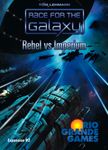- Publisher
- Rio Grande Games
- Published in
- 2007
- My Rating
- 9.0
- BGG Rating
- 7.63
- BGG Rank
- 78
- Players
- 2-4
- Ages
- 12+
- Duration
- 1:00
- Complexity
- 2.9909 / 5
- Acquired
- August 2008
- Eager to Play
- No
- Plays
- 14
- Last Played
- January 31, 2020
- Time Spent
- 11:20
In Race for the Galaxy players are racing to achieve the preeminent civilization by settling planets and gaining technological developments. The winner is decided when one player has at least 12 developments and planets in play or a set number of victory point chips have been exhausted; the player with the most victory points wins. Each turn players secretly select which action they are going to perform, then simultaneously reveal their selection. Each action selected will grant an action for all players during that phase, with an additional bonus to the player who chose the action, so players must carefully consider not only which bonus they want on their turn but what actions the other players will choose. The actions vary from drawing cards, developing a technology, settle a planet, trade goods, consume goods, and produce goods. Actions are activated in the same order each turn (drawing first on through production) regardless of who played what; in this fashion there is no "first player". The cards in Race for the Galaxy function as either a planet or development, a good produced on a planet, or currency; this will force players to consider their options each turn based on the cards in hand, deciding which will be used to pay for the others, and this is not always an easy choice.
Each planet and development are worth victory points at the end of the game, but some planets allow you to consume goods for victory points. Other planets allow you to consume goods for more cards. Some planets can only be conquered with military might, others can simply be settled by paying its cost in cards. Some worlds produce goods, some produce goods and cards, others just produce cards. Both worlds and developments have special powers that activate only during certain actions, so players must carefully choose how to use their planets and developments in order to obtain more victory points than the other players.
With the variety of planet and development powers and the dynamics of the action choices made each turn, Race for the Galaxy tests a player's ability to build a strategy on-the-fly, and then adapt and refine that strategy as the game progresses. Players must always be aware of how their action choice will impact their opponents and work to maximize their own gain.
14 plays
- February 04, 2016 x2
- May 27, 2013
- August 12, 2009
- April 08, 2009
- January 28, 2009
- September 28, 2008
- September 27, 2008
- September 10, 2008
- September 09, 2008
- September 01, 2008 x2
- September 01, 2008
- January 31, 2020


